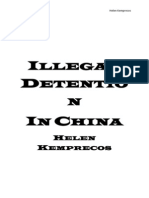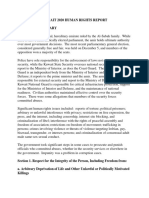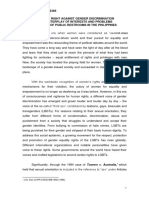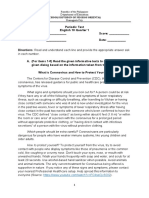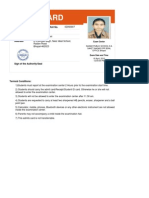Hot Spots
Hot Spots
Uploaded by
Scott KhamphouneCopyright:
Available Formats
Hot Spots
Hot Spots
Uploaded by
Scott KhamphouneOriginal Description:
Copyright
Available Formats
Share this document
Did you find this document useful?
Is this content inappropriate?
Copyright:
Available Formats
Hot Spots
Hot Spots
Uploaded by
Scott KhamphouneCopyright:
Available Formats
Six Degrees: The Stanford Journal of Human Rights
Hot Spots: Human Rights Issues Around the World
By Various Authors Winter 2013
HOT SPOTS
human rights issues around the world
despite the 1,700 reports of torture in this year alone, not a single member of the military has been brought to justice. The Mexican Supreme Court has attempted to rectify this situation, ruling in August 2012 that cases of human rights abuses against civilians should be dealt with by the civilian justice system. However, this decision comes after a similar decision in July 2011 that ruled that the judiciary must comply with 2009 Inter-American Court of Human Rights rulings prohibiting the military justice system from investigating and prosecuting human rights abuses, and as of yet there has been little to no change. Despite Calderons promises to carry out the Supreme Courts judgments and reform the use of military jurisdiction, cases of military abuses against civilians are still investigated under military jurisdiction, and cases where civilians petition to be transferred from military to civilian courts have been challenged by the military. As a result, victims have no chance for justice. Fortunately, there is hope on the horizon: President-elect Enrique Pea Nieto, elected in July of 2012, promises to take action to end torture, and says his priority is reducing the violence, rather than continue arrests and seizures. -Emilia Schrier
LIBYA
MEXICO
Mexico is suffering from a torture epidemicwidespread torture and ill treatment of civilians, which drastically increased under President Felipe Calderons government, continues to be ignored and go unpunished. This torture is a side affect of the governments attempt to combat and crack down on organized crime and drug cartelsprotection of human rights is not the governments main priority when fighting this war on drugs, which, according to a report by the Mexican government, has claimed 47,515 lives since Calderon began his military assault on criminal cartels. However, the governments heavy handed strategy has dire consequences: In 2011 alone, Mexicos National Human Rights Commission (CNDH) received about 1,700 reports of torture and ill-treatment by police and security forces500 more than last year, and over 1,000 more than in 2008. Victims of this torture are often criminal suspects, who can be held in detention for up to 80 days without being charged or released. While laws criminalizing torture do exist in Mexico, they do not meet international standards, and offenders are rarely prosecuted. Even if they are prosecuted, they are rarely convicted, because cases of abuse by military personnel are traditionally decided by the military justice system rather than by the civilian system. Consequently,
New evidence of serious human rights abuses in Libya is being uncovered on a frequent basis. Many of the abuses
occurred during the Libyan Revolution of 2011. In October of 2011 Human Rights Watch found 53 decomposing bodies in an abandoned hotel in Sirte. The people, who were Gaddafi supporters, seemed to have been executed, as many had their hands tied behind their backs. An investigation into the execution uncovered a mobile phone video clip that showed a large group of detained Gaddafi supporters being abused by rebel forces. At least 17 of the detainees were later executed in the hotel in Sirte. These killings constitute the largest execution carried out by anti-Gaddafi forces in the Libyan revolution. The uncovering of serious human rights violations in Libya has led the United Nations Security Council to increase its pressure on the Libyan Authorities to cooperate with the International Criminal Court. The Security Council Resolution of 1970 mandates Libya to cooperate fully with the ICC. At present, however, the Libyan authorities dont seem to be willing to investigate the human rights abuses that occurred during the Libyan Revolution. The mass execution of October 2011 remains a highly contentious issue. Following the discovery of the bodies in Sirte, the international community urged the Libyan authorities to carry out a full investigation and hold those responsible for the crimes accountable. Despite an initial pledge, however, there is minimal evidence that an enquiry
into the execution is being carried out. The ICC has full jurisdiction to investigate the war crimes committed by all sides in the Libyan revolution if the Libyan authorities are unwilling or unable to cooperate in the prosecution process. At present, it would seem that the ICC will be forced to step in to investigate. Olivia Bryant
CHINA
Since September, Chinese authorities have been intensifying their repression of human rights activists and government critics. Given the political scandal revolving around the corruption of Bo Xilai, a formerly prominent politician, that greatly destabilized the Chinese government, Chinas political leaders are especially adamant about maintaining strict control over the people. In order to suppress dissidents and ensure a peaceful transfer of power at the 18th Communist Party Congress in early November, the government has detained or restricted hundreds of activists. A large majority of these activists are simply peaceful protesters, petitioning for their rights; they are ordinary Chinese citizens who want the Chinese government to pay attention to the concerns of their cities and villages. Many activists have been placed under house arrest, and the offices of community groups, particularly
organizations that advocate for the protection of human rights, have been forcibly shut down despite their peaceful dissent. For instance, the Beijing Aixizhing Institute of Health Educations branch in Guangzhou, which offers health advice to ethnic minorities, had to close down because of threats from the police. Moreover, it is believed that several activists have been confined in black jails, unlawful and secret detention centers that hold dissidents without trial. These black jails reportedly include basements, hotels, and hostels across China. While criminals sent to jail leave after serving their sentence, activists sent to black jails are held indefinitely. In addition, Chinas Ministry of Information Technology is planning to further restrict the peoples access to the Internet and accurate news sources as the new leaders come into power. In early November, the New York Times published a controversial story regarding then Premier Wen JiaBao and suspicions of his familys hidden wealth. The government immediately censored the article to stem the Chinese publics criticism. Ultimately, the large-scale crackdown on government critics gives little indication that Chinas new leadership will look favorably towards activism or grant citizens more liberties. Angela Zhang
AZERBAIJAN
In the months following the Eurovision Song Contest, journalists in Azerbaijan were targeted by the government for expressing themselves on the internet and on paper. According to the Institute for Reporters Freedom and Safety (IRFS), more than 50 domestic and foreign journalists were harassed or attacked in 2011. Idrak Abbasov, a correspondent for IRFS and for independent newspapers Ayna and Zerkalo, was severely beaten by twenty policemen and guards in April of 2012. The Azerbaijani government has failed to investigate the crime that led to the hospitalization of Abbasov. As of November, no one has been held responsible for the beating of this journalist. Authorities in Baku, the nations capital, have also managed to ban IRFS from participation in peaceful public assembly. This ban perpetuates the situation in Azerbaijan; citizens are unable to display their disapproval of the governments restrictive and corrupt actions without being punished themselves. According to Human Rights Watch, authorities in Baku limit freedom of expression by interrupting peaceful protests, often with unjust arrests and even violence. At one October demonstration in Baku, protestors were beaten and forced into police cars and buses; at least thirteen peaceful protestors were sentenced to up to ten days of detention on misdemeanor charges. Melissa Diaz
hot spots
COCOA
The Hershey Company announced in October 2012 that it will shift its production to 100% certified cocoa by 2020. This comes after pressure from online activism, physical protests outside their flagship in New York City, and petitions. The chocolate giant made the pledge in order to assure that it [cocoa] is grown in line with the highest internationally recognized standards for labor, environmental and better farming practices, as it declared in a press release. Currently, just 5% of global chocolate is certified as fair trade, slavery free, environmentally sound, or some other guarantee. They have not specified which certification they will seek out, or if it will be a combination of multiple different ones. No matter what form of documentation is acquired, this is a necessary and symbolic step by the largest chocolate manufacturer in North America. It is fair to say than everyone appreciates chocolate in some form: hot cocoa, Reeses Peanut Butter Cups, Lindt truffles, 90% cacao bars from Whole Foods. But the chocolate consumed in the world over has ongoing implications for human rights in areas where it is cultivated, particularly West Africa. 43% of the worlds chocolate comes from small, unregulated farms in the Ivory Coast, and even more comes from other regional countries. Because the cocoa fields are not effectively
monitored, it is unknown precisely how much of this massive crop is cultivated using child slave labor, but a decade ago the US State Department estimated that 15,000 children were trafficked into this industry each year. Most of the children are between the ages of nine and twelve, and are promised steady payment to help support their families in nearby countries, including Mali, Burkina Faso, and Togo, but are then never paid. Even for laborers who are not enslaved, the average wage on a West African chocolate plantation is the equivalent of just 80 cents per day. After harvest, these corrupt cocoa beans are mixed with those picked with free labor, and sent to processing plants in Europe and the United States. Hersheys declaration comes after similar actions by other confectionary giants. Mars, Inc., the largest manufacturer of chocolate products in the world, introduced its first guaranteed Fair Trade products early in 2012. Cadbury Schweppes was the first to act in 2000, enacting a policy to preclude the use of forced labor [and] ensure that children are employed only under circumstances that protect them from physical risks, and do not disrupt their education. Kelsey Josund
UNITED STATES
In the recent election in the United States, California rejected a proposition to repeal the death penalty in the state.
Though many were shocked and somewhat outraged, it brought to light that the US is one of the few remaining countries in the western world which continues to use capital punishment. With the exception of Belarus, the entire European and North American continents have abolished the death penalty entirely. Other regions of the world where this violation of human rights is still allowed include China, Southeast Asia, the Middle East and North Africa. It is time for the United States to face the fact that capital punishment is an antiquated, unorthodox form of punishment. In Texas alone, some 249 executions have been ordered since 2001 with some of the victims being as young as 18 and 19. In 2010, the US was ranked 5th in the amount of deaths by capital punishment after China, North Korea, Iran and Yemen. How can a country with such moral justice permit the government to sink to the level of the criminals themselves? With respect to the other movements within global affairs, the US is falling behind in a matter of extreme importance with regard to human rights. The reasons for continuing the practice continue to grow weaker. Many argue that the prospect of death will deter the criminals, though many studies have shown that in the moment of committing a crime the prospect of the death penalty does not have an impact on the imminent actions of the
human rights issues around the world
killer. Furthermore, it has been proven that it is more of a financial burden to keep criminals on death row than it is to imprison them for life. With no better arguments it is time for the United States to join the international community and prohibit the use of the death penalty once and for all. Stephanie Sapp
TANZANIA
Though Tanzania has been free from colonialism for over five decades, residents of the sub-Saharan African country fear a new form of exploitation: land grabs. In 2006, the British company Sun Biofuels leased 8,000 hectares of land in the district of Kisarawe. In order to grow the biofuel jatropha for profit, Sun Biofuels seized land from villagers who depended on the lands for their livelihoods. They obtained agreement by promising 100,000 Tanzanian shillings per acre, as well as new wells, clinics, schools, and roads. None of these promises were fulfilled, and villagers were denied access to nearby water sources, the graves of loved ones, and the harvests that once sustained their families.This was neither the first nor last instance of land grabs in Tanzania, which have grown into a serious problem. Land grabs are motivated by three major reasons: bio-energy development, food production, and investment. Foreign, multinational corporations
seek profit from the mandatory bioenergy targets set by European and North American nations, and have turned to sub-Saharan Africa to supply the land necessary for biofuel growth. Following the food crisis of 2008, many investing nations began organizing land deals and subleasing to private corporations in order to produce food for export. Corporations also see the rising values of land in the face of upcoming food scarcity, and hope to capitalize on them by buying land early on.Unfortunately, the villagers originally inhabiting these fields are left severely victimized in this scenario. Even if giant corporations were willing to honor their promises, many villagers are unaware of the value of the land they possess, or the fact that they have any rights to the land at all. Stories have surfaced of villagers offering away land for only a couple of beers, leaving their children with no inheritance. Until a coalition of local affected peoples, foreign and native governments, and worldwide organizations unites to end these practices, Tanzania can never be free of this injustice.but should proceed cautiously. Afia Khan
Cte dIvoire
Amnesty International and Greenpeace Netherlands released a report that is the culmination of a three-year investigation into toxic waste dumping
in and around the city of Abidjan, Cte dIvoire. The report, entitled The Toxic Truth, alleges that in August 2006, the corporation Trafigura disposed of toxic waste at sea as a cheap alternative to responsible disposal options offered in the Netherlands. The charter ship, Probo Koala, was turned away by several countries before offloading over 500 tons of waste in Cte dIvoire. Over 100,000 people sought medical care upon suffering a range of symptoms induced by the undisclosed toxic waste, and 17 people died. The government of Cte dIvoire subsequently granted Trafigura legal immunity in exchange for financial settlement, but Dutch courts convicted the company of illegally exporting the waste from the Netherlands. Following a UN report supporting the claim that the waste was responsible for the injuries of over 31,000 people, Trafigura announced that it would pay $46 million in compensation to claimants, but continued to deny responsibility. The Amnesty/Greenpeace report calls for further assessment of the environmental and health impacts of the waste dumping as well as further legal action against the company. It also provides guidelines for the international community to establish policies ensuring that transnational corporations like Trafigura cannot elude accountability for such actions in the future. Rajiv McCoy
You might also like
- Hot SpotsDocument4 pagesHot SpotsstanfordsixdegreesNo ratings yet
- Illegal Detention in ChinaDocument5 pagesIllegal Detention in Chinahelen_kemprecosNo ratings yet
- El Salvador - United States Department of State 2Document1 pageEl Salvador - United States Department of State 2thekamilookoutNo ratings yet
- El Salvador 2022 Human Rights ReportDocument36 pagesEl Salvador 2022 Human Rights ReportJo niggathugslifeNo ratings yet
- Traduccion Pronunciamiento DDHHDocument2 pagesTraduccion Pronunciamiento DDHHAnonymous ncyx2ZC8No ratings yet
- Gabon 2022 Human Rights ReportDocument24 pagesGabon 2022 Human Rights Reportpaybag2020No ratings yet
- Gabon 2021 Human Rights ReportDocument25 pagesGabon 2021 Human Rights Reportpaybag2020No ratings yet
- Saudi Arabia Executive SummaryDocument34 pagesSaudi Arabia Executive Summaryargheyk petersNo ratings yet
- Group 48 Newsletter - September 2012Document8 pagesGroup 48 Newsletter - September 2012Joanne LauNo ratings yet
- Position Paper Regarding Death PenaltyDocument4 pagesPosition Paper Regarding Death PenaltyJhanineNo ratings yet
- Gabon: L'union Newspaper Claimed There Were at Least Six Deaths. Opposition ReportsDocument19 pagesGabon: L'union Newspaper Claimed There Were at Least Six Deaths. Opposition ReportsFranck JocktaneNo ratings yet
- Thesis On Police TortureDocument6 pagesThesis On Police Torturedianeallensavannah100% (2)
- HMV1 ST DraftDocument4 pagesHMV1 ST Draftroysaptarshi620No ratings yet
- China and The (Ab) Use of The Death PenaltyDocument3 pagesChina and The (Ab) Use of The Death PenaltyKyungsun choiNo ratings yet
- Peru 2023 Human Rights ReportDocument40 pagesPeru 2023 Human Rights ReportDaniel CHNo ratings yet
- Bahrain Briefing March 2013Document4 pagesBahrain Briefing March 2013John HorneNo ratings yet
- United Arab Emirates Human Rights Report 2017Document37 pagesUnited Arab Emirates Human Rights Report 2017ArabLeaksNo ratings yet
- HRC Statement 06 July 09Document4 pagesHRC Statement 06 July 09Baataraa BayaraaNo ratings yet
- Egypt 2023 Human Rights ReportDocument84 pagesEgypt 2023 Human Rights Reportmoouazzani00No ratings yet
- Algeria 2021 Human Rights ReportDocument52 pagesAlgeria 2021 Human Rights Reportmohammed.007No ratings yet
- 2009 Human Rights Report: China (includes Tibet, Hong Kong, and Macau)From Everand2009 Human Rights Report: China (includes Tibet, Hong Kong, and Macau)No ratings yet
- Kenya 2021 Human Rights ReportDocument62 pagesKenya 2021 Human Rights ReportBrian OmariNo ratings yet
- Homosexuality in Chile Has Been A Subject of Varying Degrees Consideration and Change Throughout Its HistoryDocument6 pagesHomosexuality in Chile Has Been A Subject of Varying Degrees Consideration and Change Throughout Its HistoryMaría Angélica Povea AcevedoNo ratings yet
- Refworld - U.SDocument16 pagesRefworld - U.SFranck JocktaneNo ratings yet
- Bolivia 2023 Human Rights ReportDocument40 pagesBolivia 2023 Human Rights ReporttaelimasNo ratings yet
- Peru 2022 Human Rights ReportDocument28 pagesPeru 2022 Human Rights ReportMelanieNo ratings yet
- Criminal Justice: ExcerptedDocument25 pagesCriminal Justice: ExcerptedScribd Government DocsNo ratings yet
- Identity Crisis of The Philippine Government - Argumentative E. (Cayago, Alethea C. - 12-Humss)Document3 pagesIdentity Crisis of The Philippine Government - Argumentative E. (Cayago, Alethea C. - 12-Humss)Alethea Cruz CayagoNo ratings yet
- Zambia 2021 Human Rights ReportDocument36 pagesZambia 2021 Human Rights ReportAngelo-Daniel SeraphNo ratings yet
- Progress, Stagnation, Regression? The State of Human Rights in The Philippines Under AquinoDocument19 pagesProgress, Stagnation, Regression? The State of Human Rights in The Philippines Under AquinoEdwin EgarNo ratings yet
- HR AssignmentDocument15 pagesHR AssignmentRen ConchaNo ratings yet
- Cruz, Charlene Anne - The State of Philippine Human Rights - 2FDocument6 pagesCruz, Charlene Anne - The State of Philippine Human Rights - 2Fcaj.cruzNo ratings yet
- Discriminatory Immigration Policies Within Public International LawDocument13 pagesDiscriminatory Immigration Policies Within Public International Lawluisa moncada hernandezNo ratings yet
- Muhammad Ali Syed - UDHR AssignmentDocument24 pagesMuhammad Ali Syed - UDHR AssignmentSyedMuhammadAliNo ratings yet
- China ReportDocument19 pagesChina ReportHarold Jeff LagutaoNo ratings yet
- Js1 Upr17 CHN e MainnklnkDocument7 pagesJs1 Upr17 CHN e MainnklnkMaja TorloNo ratings yet
- Nepal - United States Department of StateDocument33 pagesNepal - United States Department of StateButter pauroti TVNo ratings yet
- II. 2022 - US Department of State - China 2020 Human Rights ReportDocument87 pagesII. 2022 - US Department of State - China 2020 Human Rights ReportEnkhjargal BayartNo ratings yet
- 204405Document160 pages204405SethHartiganNo ratings yet
- Say Their Names: 101 Black Unarmed Women, Men and Children Killed By Law EnforcementFrom EverandSay Their Names: 101 Black Unarmed Women, Men and Children Killed By Law EnforcementNo ratings yet
- SochumguiaDocument2 pagesSochumguiaapi-308666826No ratings yet
- North KoreaDocument27 pagesNorth KoreaBivek Singh BasnyatNo ratings yet
- Tunisia 2022 Human Rights ReportDocument38 pagesTunisia 2022 Human Rights ReportHichem AbdouNo ratings yet
- Jamaica 2022 Human Rights ReportDocument23 pagesJamaica 2022 Human Rights ReportWimukthi Sagara SilvaNo ratings yet
- Report On 110 Black / Afrikan People Murdered by Police Between January 1, 2012 and June 30, 2012Document10 pagesReport On 110 Black / Afrikan People Murdered by Police Between January 1, 2012 and June 30, 2012ch0zen_1No ratings yet
- Kenya Executive SummaryDocument49 pagesKenya Executive SummaryafyanixyzNo ratings yet
- Libya Rule of Law or Rule of MilitiasDocument57 pagesLibya Rule of Law or Rule of MilitiasTortura ChinaNo ratings yet
- Kuwait 2020 Human Rights ReportDocument44 pagesKuwait 2020 Human Rights ReportAhmad AlfarhanNo ratings yet
- CivicsDocument11 pagesCivicsNatnael BelaynehNo ratings yet
- Torture Asian and Global PerspectivesDocument80 pagesTorture Asian and Global PerspectivesTracyNo ratings yet
- Extra Judicial Killing in The PhilippinesDocument5 pagesExtra Judicial Killing in The Philippinesapi-341275251No ratings yet
- ICTJ World ReportDocument4 pagesICTJ World ReportimpunitywatchNo ratings yet
- LGBT Right: Use of Public Restroom (Short Paper)Document8 pagesLGBT Right: Use of Public Restroom (Short Paper)Jefferson SecillanoNo ratings yet
- Moldova 2018 Human Rights ReportDocument46 pagesMoldova 2018 Human Rights ReportAnonymous 6afpZ7KElrNo ratings yet
- As A 3735412021 EnglishDocument6 pagesAs A 3735412021 EnglishThavam RatnaNo ratings yet
- Republic Act No. 9201.: 1. What Are Human Rights?Document4 pagesRepublic Act No. 9201.: 1. What Are Human Rights?MichelleneChenTadleNo ratings yet
- Police Brutality By: Ochs, Holona L. Gonzalzles, Kuroki M. Salem Press Encyclopedia. 6p. Police BrutalityDocument7 pagesPolice Brutality By: Ochs, Holona L. Gonzalzles, Kuroki M. Salem Press Encyclopedia. 6p. Police BrutalityAlaa Rashed100% (1)
- nepal_impunityDocument21 pagesnepal_impunityPuskar KhanalNo ratings yet
- Criminalizing Communities: NYPD Abuse of Vulnerable PopulationsDocument25 pagesCriminalizing Communities: NYPD Abuse of Vulnerable PopulationsCity Limits (New York)No ratings yet
- Extrajudicial ExecutionsDocument33 pagesExtrajudicial ExecutionsMosi Ngozi (fka) james harrisNo ratings yet
- Itc ProjectDocument38 pagesItc ProjectanandbittuNo ratings yet
- Complaint LetterDocument1 pageComplaint Letterapi-515409227No ratings yet
- Solid Waste ManagementDocument21 pagesSolid Waste ManagementChandan 1GG20CV004No ratings yet
- h16566 Ds 6500b Switches SsDocument5 pagesh16566 Ds 6500b Switches SsNayanajith Shehan AttapattuNo ratings yet
- 403 - 404 - 405 - 406 - 407 - 408 - 409 - Generation (Vermontelectric - Coop)Document9 pages403 - 404 - 405 - 406 - 407 - 408 - 409 - Generation (Vermontelectric - Coop)LEON SOTNASNo ratings yet
- Close TurfingDocument5 pagesClose TurfingUmaira ZainalNo ratings yet
- White Label WhatsApp Chatbot by Bot PenguinDocument8 pagesWhite Label WhatsApp Chatbot by Bot PenguinbotpenguinseoNo ratings yet
- Collection of DataDocument3 pagesCollection of DataAmritesh DubeNo ratings yet
- Submerged Arc WeldingDocument2 pagesSubmerged Arc WeldingcalcedaNo ratings yet
- USP 851 Espectro y EscáteringDocument6 pagesUSP 851 Espectro y EscáteringgustavoesanchezNo ratings yet
- Historical Society of Ghana Transactions of The Historical Society of GhanaDocument13 pagesHistorical Society of Ghana Transactions of The Historical Society of GhanaMamello Meme BolofoNo ratings yet
- English 10 1st ReviewedDocument8 pagesEnglish 10 1st ReviewedShekinah FuentesNo ratings yet
- Bombardier Challenger 300 BrochureDocument3 pagesBombardier Challenger 300 BrochureGourav DasNo ratings yet
- Centifugal PumpDocument8 pagesCentifugal PumpTinaaTinyNo ratings yet
- UntitledDocument36 pagesUntitledGopal JahagirdarNo ratings yet
- Arc Furnace Modeling in ATP-EMTPDocument6 pagesArc Furnace Modeling in ATP-EMTPsalonki6162No ratings yet
- BS 746-1987Document16 pagesBS 746-1987theNo ratings yet
- Admit CardDocument2 pagesAdmit CardSumit AdwaniNo ratings yet
- 00 CompleteGroupB MonographUpdatesDocument121 pages00 CompleteGroupB MonographUpdatesMOHAMMEDNo ratings yet
- CF5396 - Sika LimitedDocument16 pagesCF5396 - Sika LimitedvjekosimNo ratings yet
- Diagnostic Accuracy of Xpert MTB/RIF On Bronchoscopy Specimens in Patients With Suspected Pulmonary TuberculosisDocument6 pagesDiagnostic Accuracy of Xpert MTB/RIF On Bronchoscopy Specimens in Patients With Suspected Pulmonary TuberculosisMARTIN FRANKLIN HUAYANCA HUANCAHUARENo ratings yet
- Assignment 1-Brief - Remoting Working - Mai Tran Nguyen Khoi 1639....Document37 pagesAssignment 1-Brief - Remoting Working - Mai Tran Nguyen Khoi 1639....Le Thanh Huy (FGW HCM)No ratings yet
- Exercise Completing The AuditDocument4 pagesExercise Completing The AuditMhegan ManarangNo ratings yet
- FortiClient EMS 6.2.0 Administration GuideDocument191 pagesFortiClient EMS 6.2.0 Administration GuideLászló SzabóNo ratings yet
- Resolution No. 18-2007: HereasDocument6 pagesResolution No. 18-2007: HereasJill IsaiahNo ratings yet
- Tigo Enters New Partnership With DTBi and COSTECH To Promote ICT and Create Youth Employment in The CountryDocument2 pagesTigo Enters New Partnership With DTBi and COSTECH To Promote ICT and Create Youth Employment in The CountryMuhidin Issa MichuziNo ratings yet
- Mid Brain Activation Workshop Training Guide (Children)Document5 pagesMid Brain Activation Workshop Training Guide (Children)Anonymous 3IvtCeYNo ratings yet
- Cummins: Fault Code: 528 PID: P093 SPN: 093 FMI: 2Document4 pagesCummins: Fault Code: 528 PID: P093 SPN: 093 FMI: 2Enrrique LaraNo ratings yet
- 606 Educational Measurement and EvaluationDocument3 pages606 Educational Measurement and EvaluationJhie Fortu FabellonNo ratings yet
- The Globe Issue No 38Document12 pagesThe Globe Issue No 38The Globe NewspaperNo ratings yet

